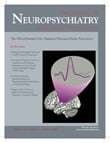A Sibutramine-Induced Delusional Disorder Relapse
SIR: Sibutramine, an antiobesity drug, is a serotonin, norepinephrine, and, to a minor degree, dopamine reuptake inhibitor. Sibutramine has been associated with previous reports of psychosis, 1 hypomania and mania, 2 , 3 exacerbations of panic attacks, 4 depression, and suicidal tendencies. 5 Its abuse is currently under investigation. We report a patient who experienced a delusional disorder relapse shortly after being started on a regimen of sibutramine.
Case Report
A 50-year-old man presented with an acute paranoid state and behavioral alterations. He was diagnosed in 1987 as having a delusional disorder due to a paranoid and esoteric systematized delirium. Maintenance treatment with thioridazine (50mg/day) provided him with a mental state fit for social and work environments with only three similar relapses in 15 years. He was married, had one daughter, and worked in a company business.
On June 27, 2002, he was prescribed sibutramine, 9mg b.i.d., to treat obesity. Two days later, he began to feel anxious, with concentration and coordination difficulties mainly in vehicle conduction. The patient reduced the sibutramine dosage himself to 9mg/day. Over the next two weeks, his mental state continued to deteriorate. He presented with an acute florid delirious state associated with intense reference, suspiciousness, anxiety, and insomnia, requiring hospital admission. He denied any other psychiatric treatment, neurological disturbance, or substance abuse. Sibutramine treatment was discontinued and replaced by antipsychotic treatment. During the following 3 weeks, symptoms completely resolved. Diagnosis was a delusional disorder relapse without considering a potential sibutramine influence.
A few weeks later, sibutramine was reintroduced (9mg/day). Within days, he suffered another relapse with intense reference and paranoid and catastrophic delirious symptoms associated with logorrhea, irritability, excitability, and insomnia. He was admitted to our psychiatric unit. Physical examination indicated hypertension (180/100 mmHg, 100 b.b.p.). Neurological exploration, laboratory, and electrocardiography tests did not reveal any significant abnormalities. Sibutramine was suspended and quetiapine (400mg b.i.d.) and hidrosaluretil (50mg/day) were prescribed.
The delirious relapse remitted for over 3 weeks post-sibutramine discontinuation and the patient did not report any symptoms thereafter. He remained stable on a regimen of thioridazine (50mg/day) in posterior controls. Given that the symptoms began shortly after sibutramine was initiated or readministered, and were relieved after it was discontinued, sibutramine was thought to be the cause.
Comment
Since overweight and obesity have become emergent pathologies, classical treatment based on dietetic guidelines has improved with drug therapies. The heart valve problems arising from the use of fenfluramine and phentermine, raises questions about the safety and effectiveness of diet drugs. The FDA (Food and Drug Administration) took them off the market in 1997. Recently, French Pharmacovigilance Centres reported depression and suicidal tendencies associated with sibutramine in patients without such previous episodes. 5 In Spain, cautioned by some fatal cases in Italy, government agencies produced an advertisement outlining strict sibutramine prescription. This case report is confirmation that any ongoing use of sibutramine in psychiatric patients should be closely monitored during and prior to treatment, although the exact mechanism for this reaction in unknown.
1. Taflinski T, Chojnacka J: Sibutramine-associated psychotic episode. Am J Psychiatry 2000; 157:2057–2058Google Scholar
2. Cordeiro Q, Vallada H: Sibutramine-induced mania episode in a bipolar patient. Int J Neuropsychopharmacol 2002; 5:283–284Google Scholar
3. Benazzi F: Organic hypomania secondary to sibutramine-citalopram interaction. J Clin Psychiatry 2002; 63:165Google Scholar
4. Binkley K, Knowles SR: Sibutramine and panic attacks. Am J Psychiatry 2002; 159:1793–174Google Scholar
5. LRP: Sibutramine: nouveaux effets indésirables. La Revge Prescrire Janvier 2003; 23:26Google Scholar



